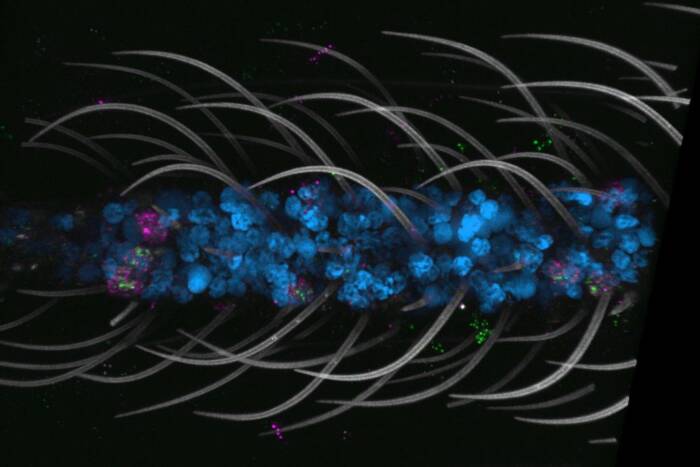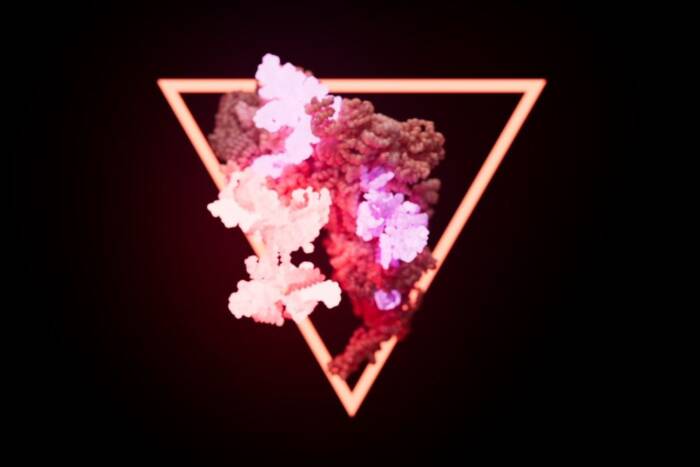Immunity runs amok without Csk
Deconstructing inflammation at the molecular level
Inflammation is emerging as a new window on chronic diseases such as cancer, heart ailments and autoimmunity. Two Rockefeller University scientists have recently revealed one of the molecular keys to inflammation. Their discovery may help clinicians understand shortcomings in the inflammatory response that lead to potentially life-threatening conditions.
When the body responds to the presence of a pathogen, pathogen fighter cells called neutrophils or granulocytes squeeze through the cell borders in the blood vessel wall and migrate in amoeba-style into the infected tissue. Upon arrival, these early responder immune cells must change their character. They become highly activated, able to engulf and destroy microbial offenders.
Once triggered, the inflammation response can continue indefinitely and cause serious consequences like sepsis and death. Unchecked inflammation in acute or chronic form has devastating potential.
Sasha Tarakhovsky, Ph.D., head of the laboratory of lymphocyte signaling at Rockefeller University, working with a team from the Windeyer Institute at University College London (UCL), have discovered in mice the enzyme that halts inflammation. Enzymes play important facilitating roles in the body: they drive metabolism, replicate DNA, read genes, convey signals from the outside of the cell to their destinations within and perform many other functions.
The enzyme Tarakhovsky and his colleagues scrutinized, called Csk, limits the biochemical signaling that tells cells to change their shape and texture from non-adhesive to adhesive, a key event controlling the initiation of inflammation. The enzyme helps restore non-inflammatory status to an anatomical locale. What’s more, Csk is found in every organism from hydra to humans, suggesting a crucial role that may be similar across many species.
The discovery of Csk as the body’s stop-order on inflammation is the cover story of this month’sImmunity, published Feb. 17, appearing almost simultaneously with a Time magazine cover story on inflammation and chronic disease called, “The Secret Killer: The surprising link between inflammation and heart attacks, cancer, alzheimer’s and other diseases.” The Time magazine article underscores the increasing emphasis on understanding the links between inflammation and disease.
“The important role of Csk is an unexpected finding,” says Tarakhovsky. “The enzyme is part of a family of enzymes we know to be involved with a different kind of immune system function. Its presence in inflammation runs counter to what we would have predicted.”
Tarakhovsky should know. He’s one of the world’s experts in immune system signaling pathways, and in particular, Csk and its family of enzymes, known as the Src family kinases (SFKs). A few of his notable discoveries before now explain the role of SFKs in T and in B cells, immune system cells also responsible for highly effective defenses to pathogenic assaults, but at a later stage of immune response. For T cells in the body, Tarakhovsky and his colleagues have learned, Csk is responsible for initiating a fine-tuning these cells undergo in order to control pathogens.
Because Tarakhovsky has been so successful in understanding the role of Csk in T cells, Jürgen Roes and Richard Thomas, both immunologists based in London, sought his expertise in answering the question of whether Csk plays a role in inflammation. “We know that Csk is a negative regulator of many processes and that it is a key enzyme in the adaptive immune response,” Tarakhovsky explains. “We wanted to find out whether Csk plays an important role in innate immune response.” (The innate immune response is an immediate defense against potentially harmful microbes, while the adaptive immune response protects the body through a more versatile set of defenses that often prevent re-infection with the same pathogen or provide sophisticated defenses against microbes that the innate defenses cannot recognize.)
To find out, the scientists genetically inactivated Csk in granulocytes, the white blood cells that carry out the first line of defense by rapidly migrating to sites of infection or inflammation, where they engulf and kill microbial pathogens.
What they found is that, without the enzyme Csk, the normally precise granulocyte cells behaved abnormally, were hyper-sensitive, and seemingly lost their temper. Spontaneous inflammation in Csk-deficient mice occurred at a high frequency. These results indicate that Csk is a strong negative regulator of the inflammatory response of the innate immune system. Without Csk, the biochemistry of inflammation seems to run amok.
Csk performs a specialized process called signal transduction, bringing a chemical message from the cellular surface-in this case, during an inflammatory response-to the nucleus of a cell.
Still more must be determined. Csk may be an important component in halting the inflammatory response, but the current research does not explain the whole story of chronic inflammation. Whether some people have a stronger or weaker genetic predisposition to the Csk signal still must be learned. Targeting drugs to Csk or the enzymes it inhibits is perhaps a possibility in establishing better inflammatory controls in the immune system.
Finally, inflammation is a general, and partial, response to pathogens-part of what is known as innate immunity. T and B cell response, on the other hand, is a selective and concerted response to individual pathogens that is part of adaptive immunity. The correlations between innate and adaptive immunity are not entirely understood.
Tarakhovsky and his research team continue to study the signaling of the immune cells, as opposed to the general model of inflammation and disease.
The research group at UCL plans to continue the search for inhibitory mechanisms of inflammation, which in concert with Csk, ensure that the powerful anti-microbial immune mechanism stays focused to minimize the risk of inflammatory disease.
This research was funded by The Wellcome Trust, UK and The Rockefeller University.


